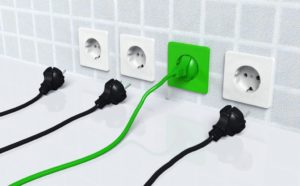


 This is how our Green New Deal law will cut carbon emissions: Eighty nine percent of all carbon emissions in Massachusetts come from three sources: cars, trucks and buses that burn gasoline (42% read report); residential and commercial heating systems that burn natural gas or oil (27% read report); and power plants that generate electricity by burning coal and natural gas (20%).
This is how our Green New Deal law will cut carbon emissions: Eighty nine percent of all carbon emissions in Massachusetts come from three sources: cars, trucks and buses that burn gasoline (42% read report); residential and commercial heating systems that burn natural gas or oil (27% read report); and power plants that generate electricity by burning coal and natural gas (20%).
The only realistic way to eliminate carbon emissions is to stop using products that emits carbon. That means switching over, on a massive scale, to vehicles and home heating systems that are powered by clean energy. Unfortunately, the ambitious and genuinely forward looking law that was recently passed in Massachusetts (Chapter 8 of the Acts of 2021, An Act creating a next-generation roadmap for Massachusetts climate policy) offers no meaningful financial support or other practical incentives to help people actually make that switch to clean energy.
That law, which requires that carbon emissions be eliminated by 2050, will have no practical effect if most people can’t afford to switch to clean energy and are forced to continue driving cars and using home heating systems that generate carbon pollution. And even if they can afford to make the switch, giving people incentives to buy electric vehicles or electric home heating won’t reduce carbon emissions if they just sell or trade in their gas burning vehicle to someone else, or if they continue to rely on electricity generated by burning coal or natural gas.
 This is what your signature will do: The ballot initiative that we are proposing will give taxpayers a significant financial incentive, in the form or a tax credit or point of sale rebate, to buy an EV, high efficiency heat pump, solar power system or electricity storage system.
This is what your signature will do: The ballot initiative that we are proposing will give taxpayers a significant financial incentive, in the form or a tax credit or point of sale rebate, to buy an EV, high efficiency heat pump, solar power system or electricity storage system.  However, to be eligible for the tax credit or point of sale rebate for an EV purchase, the taxpayer must have the engine in their high carbon emission vehicle removed and destroyed, or have their vehicle converted to an EV. If they are buying a high efficiency heat pump, it must have integrated controls to reduce their reliance on heating oil or natural gas for home heating by only using those systems when it is very cold outside. Any taxpayer who buys a heat pump, solar power system or electricity storage system must also buy Renewable Energy Certificates, which will force power companies to reduce their reliance on coal and natural gas for electricity generation. In other words, the initiative gives taxpayers a big financial benefit, but only if they significantly reduce the carbon emissions for which they are personally responsible.
However, to be eligible for the tax credit or point of sale rebate for an EV purchase, the taxpayer must have the engine in their high carbon emission vehicle removed and destroyed, or have their vehicle converted to an EV. If they are buying a high efficiency heat pump, it must have integrated controls to reduce their reliance on heating oil or natural gas for home heating by only using those systems when it is very cold outside. Any taxpayer who buys a heat pump, solar power system or electricity storage system must also buy Renewable Energy Certificates, which will force power companies to reduce their reliance on coal and natural gas for electricity generation. In other words, the initiative gives taxpayers a big financial benefit, but only if they significantly reduce the carbon emissions for which they are personally responsible.
 the initiative allows a substantial state tax credit that rolls over year to year until it’s used up, or an immediate point of sale rebate for low income tax filers, to buy a battery or plug in hybrid electric vehicle. To qualify for the tax credit or rebate, the taxpayer must sell their gas burning vehicle to an authorized dealer or shop that is required to either remove the internal combustion engine and destroy it or convert the vehicle to a plug in hybrid. The tax credit or rebate is equal to the smallest of: (i) three times the trade in value of the gas burning vehicle with the engine still inside; (ii) 50% of the purchase price of the new EV; and (iii) $25,000. The initiative also allows owners of gas burning vehicles to convert them to batter or plug in hybrid EVs and receive a tax credit or immediate point of sale rebate equal to the full cost of the conversion.
the initiative allows a substantial state tax credit that rolls over year to year until it’s used up, or an immediate point of sale rebate for low income tax filers, to buy a battery or plug in hybrid electric vehicle. To qualify for the tax credit or rebate, the taxpayer must sell their gas burning vehicle to an authorized dealer or shop that is required to either remove the internal combustion engine and destroy it or convert the vehicle to a plug in hybrid. The tax credit or rebate is equal to the smallest of: (i) three times the trade in value of the gas burning vehicle with the engine still inside; (ii) 50% of the purchase price of the new EV; and (iii) $25,000. The initiative also allows owners of gas burning vehicles to convert them to batter or plug in hybrid EVs and receive a tax credit or immediate point of sale rebate equal to the full cost of the conversion.
 For home owners, the initiative allows a substantial state tax credit that rolls over year to year until it’s used up, or an immediate point of sale rebate for low income tax filers, to install a high efficiency heat pump, solar power system or energy storage system. The tax credit or rebate is equal to the smaller of: (i) 75% of the purchase price of the new heat pump, solar power system or energy storage system; and (iii) $25,000. To qualify for the tax credit, the taxpayer must purchase Class 1 Renewable Energy Certificates (RECs) to cover 100% of their electricity usage before they buy the system, and since the credits roll over year to year until they are used up, the taxpayer must continue to buy RECs as long as they are claiming the tax credit.
For home owners, the initiative allows a substantial state tax credit that rolls over year to year until it’s used up, or an immediate point of sale rebate for low income tax filers, to install a high efficiency heat pump, solar power system or energy storage system. The tax credit or rebate is equal to the smaller of: (i) 75% of the purchase price of the new heat pump, solar power system or energy storage system; and (iii) $25,000. To qualify for the tax credit, the taxpayer must purchase Class 1 Renewable Energy Certificates (RECs) to cover 100% of their electricity usage before they buy the system, and since the credits roll over year to year until they are used up, the taxpayer must continue to buy RECs as long as they are claiming the tax credit.
 Doesn’t the Mass Save program already do this? This campaign is not affiliated with and has not been endorsed by Mass Save. But we did take the inspiration for this ballot initiative from the rebates that Mass Save offers for heat pumps, solar and energy storage. We just changed the rebates to tax credits for middle and high income taxpayers and made the tax credits and low income point of sale rebate a lot larger. Plus we added EVs. This initiative is basically Mass Save on steroids.
Doesn’t the Mass Save program already do this? This campaign is not affiliated with and has not been endorsed by Mass Save. But we did take the inspiration for this ballot initiative from the rebates that Mass Save offers for heat pumps, solar and energy storage. We just changed the rebates to tax credits for middle and high income taxpayers and made the tax credits and low income point of sale rebate a lot larger. Plus we added EVs. This initiative is basically Mass Save on steroids.
Why a tax credit instead of a rebate for middle and high income taxpayers? Ideally, consumers would receive a direct rebate for their purchase under this initiative. But this would require an appropriation and the Massachusetts Constitution does not allow ballot initiatives to appropriate money. That’s why we structured the initiative around a state tax credit. Legally a tax credit is a tax cut, not an appropriation, so we’re allowed to do it as a ballot initiative. In practice, the tax credit is the same as a cash rebate. If you owe $2,500 in state taxes and you have a $10,000 credit, you can reduce your tax bill to zero with the credit and be left with a $7,500 credit to use the following year, and subsequent years after that until the credit is used up.
Where does the financing for the rebates come from? For every purchase made under this initiative, the buyer is charged a 2% surcharge that goes into a fund created by the initiative called the Zero Emission Universal Service. The point of sale rebates are paid for by this fund. If the fund runs out of money, the rebates are paused and only resumed once the fund is recharged.
 What if the taxpayers can’t afford the purchase an EV even with the credit or rebate? To sell EVs, dealers will be required to offer 10 year 0% interest loans. Combined with the credit or rebate, and with payments spread over ten years, purchases under this initiative becomes easier to afford than less expensive legacy high emission vehicles.
What if the taxpayers can’t afford the purchase an EV even with the credit or rebate? To sell EVs, dealers will be required to offer 10 year 0% interest loans. Combined with the credit or rebate, and with payments spread over ten years, purchases under this initiative becomes easier to afford than less expensive legacy high emission vehicles.
 What is a Renewable Energy Certificate? When someone buys a Class 1 Renewable Energy Certificate (REC), they make it harder for power plants in Massachusetts to burn coal or natural gas. Under current Massachusetts law, power plants are required to reduce their carbon emissions by 1% each year. If they are unable to hit their target for a particular year, they have the option of buying Class 1 RECs to offset their excess pollution. These certificates are sold by companies that are generating less carbon emissions than allowed under state law. However, there are a limited number of RECs in circulation and if they are bought up, the only other option for power plants will be to actually reduce their carbon emissions. Requiring homeowners to buy RECs is similar to requiring high emission vehicle owners to destroy the internal combustion engine in their trade in. Buying RECs denies them to the power plants, forcing the plants to increase the proportion of clean electricity that they generate.
What is a Renewable Energy Certificate? When someone buys a Class 1 Renewable Energy Certificate (REC), they make it harder for power plants in Massachusetts to burn coal or natural gas. Under current Massachusetts law, power plants are required to reduce their carbon emissions by 1% each year. If they are unable to hit their target for a particular year, they have the option of buying Class 1 RECs to offset their excess pollution. These certificates are sold by companies that are generating less carbon emissions than allowed under state law. However, there are a limited number of RECs in circulation and if they are bought up, the only other option for power plants will be to actually reduce their carbon emissions. Requiring homeowners to buy RECs is similar to requiring high emission vehicle owners to destroy the internal combustion engine in their trade in. Buying RECs denies them to the power plants, forcing the plants to increase the proportion of clean electricity that they generate.
 What is a high efficiency heat pump? Heat pumps basically work by transferring the heat from outside to inside, as if they’re air conditioning the outside. If it’s too cold outside, there’s not enough heat outside to transfer in. A high efficiency heat pump is a heat pump with integrated controls that connects to a high carbon emission home heating system and only turns that system on when it is too cold outside for the heat pump alone to heat the house.
What is a high efficiency heat pump? Heat pumps basically work by transferring the heat from outside to inside, as if they’re air conditioning the outside. If it’s too cold outside, there’s not enough heat outside to transfer in. A high efficiency heat pump is a heat pump with integrated controls that connects to a high carbon emission home heating system and only turns that system on when it is too cold outside for the heat pump alone to heat the house.
Why not eliminate all heating oil, natural gas and gasoline fueled systems immediately? In the case of home heating, as described above, today’s heat pumps alone can’t keep a house warm if it is too cold outside. Similarly, there is not enough charging infrastructure in place for all drivers to be able to switch to EVs. But most large auto manufacturers have already announced that by 2035 they will only be making EVs. So in the short run, if people switch to plug in hybrid cars and high efficiency heat pumps, that will immediately reduce the amount of fossil fuels we burn by a significant amount. And that puts us on track to switch completely to zero emission systems in the long run.
Doesn’t the initiative disproportionately benefit the wealthy? No. Everyone is eligible for the tax credit. Low income taxpayers whose tax bill is too low to meaningfully use a tax credit are eligible for a point of sale rebate. And since the credit is capped at $25,000 no matter how expensive the EV or home heating, solar or storage system is, wealthy taxpayers don’t receive a larger benefit than anyone else. In terms of aggregate financial benefit, since wealthy taxpayers make up a small percentage of all taxpayers, most of the tax credits and all of the rebates will go to low and middle income taxpayers.
 Doesn’t this give people a credit or rebate for a purchase they were going to make anyway? No. The credits and rebates are incentives to decommission high carbon emission cars or home heating systems. In the case of EVs, the goal of the initiative is for people to take gas burning vehicles off the road and destroy their internal combustion engines. In the case of home heating, the goal is for people to dramatically reduce their usage of heating oil and natural gas, and at the same time to buy RECs that force power plants to reduce their usage of coal and natural gas. The credits and rebates are incentives for taxpayers to take those actions to reduce their carbon footprint.
Doesn’t this give people a credit or rebate for a purchase they were going to make anyway? No. The credits and rebates are incentives to decommission high carbon emission cars or home heating systems. In the case of EVs, the goal of the initiative is for people to take gas burning vehicles off the road and destroy their internal combustion engines. In the case of home heating, the goal is for people to dramatically reduce their usage of heating oil and natural gas, and at the same time to buy RECs that force power plants to reduce their usage of coal and natural gas. The credits and rebates are incentives for taxpayers to take those actions to reduce their carbon footprint.
What if the legislature passes a similar law before the election? It is possible that between now and election day, November 2022, the legislature will pass a version of what we are proposing. If that happens, then we’ve won and we will withdraw our initiative and declare victory. Our objective is not to go to the ballot. Our objective is to pass climate change laws that will move us to zero net carbon emissions. If our initiative and your signature persuade Beacon Hill to act, we’ve achieved our objective.
 This is how our Green New Deal law will cut carbon emissions: Eighty nine percent of all carbon emissions in Massachusetts come from three sources: cars, trucks and buses that burn gasoline (42% read report); residential and commercial heating systems that burn natural gas or oil (27% read report); and power plants that generate electricity by burning coal and natural gas (20%).
This is how our Green New Deal law will cut carbon emissions: Eighty nine percent of all carbon emissions in Massachusetts come from three sources: cars, trucks and buses that burn gasoline (42% read report); residential and commercial heating systems that burn natural gas or oil (27% read report); and power plants that generate electricity by burning coal and natural gas (20%).
The only realistic way to eliminate carbon emissions is to stop using products that emits carbon. That means switching over, on a massive scale, to vehicles and home heating systems that are powered by clean energy. Unfortunately, the ambitious and genuinely forward looking law that was recently passed in Massachusetts (Chapter 8 of the Acts of 2021, An Act creating a next-generation roadmap for Massachusetts climate policy) offers no meaningful financial support or other practical incentives to help people actually make that switch to clean energy.
That law, which requires that carbon emissions be eliminated by 2050, will have no practical effect if most people can’t afford to switch to clean energy and are forced to continue driving cars and using home heating systems that generate carbon pollution. And even if they can afford to make the switch, giving people incentives to buy electric vehicles or electric home heating won’t reduce carbon emissions if they just sell or trade in their gas burning vehicle to someone else, or if they continue to rely on electricity generated by burning coal or natural gas.
 This is what your signature will do: The ballot initiative that we are proposing will give taxpayers a significant financial incentive, in the form or a tax credit or point of sale rebate, to buy an EV, high efficiency heat pump, solar power system or electricity storage system.
This is what your signature will do: The ballot initiative that we are proposing will give taxpayers a significant financial incentive, in the form or a tax credit or point of sale rebate, to buy an EV, high efficiency heat pump, solar power system or electricity storage system.  However, to be eligible for the tax credit or point of sale rebate for an EV purchase, the taxpayer must have the engine in their high carbon emission vehicle removed and destroyed, or have their vehicle converted to an EV. If they are buying a high efficiency heat pump, it must have integrated controls to reduce their reliance on heating oil or natural gas for home heating by only using those systems when it is very cold outside. Any taxpayer who buys a heat pump, solar power system or electricity storage system must also buy Renewable Energy Certificates, which will force power companies to reduce their reliance on coal and natural gas for electricity generation. In other words, the initiative gives taxpayers a big financial benefit, but only if they significantly reduce the carbon emissions for which they are personally responsible.
However, to be eligible for the tax credit or point of sale rebate for an EV purchase, the taxpayer must have the engine in their high carbon emission vehicle removed and destroyed, or have their vehicle converted to an EV. If they are buying a high efficiency heat pump, it must have integrated controls to reduce their reliance on heating oil or natural gas for home heating by only using those systems when it is very cold outside. Any taxpayer who buys a heat pump, solar power system or electricity storage system must also buy Renewable Energy Certificates, which will force power companies to reduce their reliance on coal and natural gas for electricity generation. In other words, the initiative gives taxpayers a big financial benefit, but only if they significantly reduce the carbon emissions for which they are personally responsible.
 the initiative allows a substantial state tax credit that rolls over year to year until it’s used up, or an immediate point of sale rebate for low income tax filers, to buy a battery or plug in hybrid electric vehicle. To qualify for the tax credit or rebate, the taxpayer must sell their gas burning vehicle to an authorized dealer or shop that is required to either remove the internal combustion engine and destroy it or convert the vehicle to a plug in hybrid. The tax credit or rebate is equal to the smallest of: (i) three times the trade in value of the gas burning vehicle with the engine still inside; (ii) 50% of the purchase price of the new EV; and (iii) $25,000. The initiative also allows owners of gas burning vehicles to convert them to batter or plug in hybrid EVs and receive a tax credit or immediate point of sale rebate equal to the full cost of the conversion.
the initiative allows a substantial state tax credit that rolls over year to year until it’s used up, or an immediate point of sale rebate for low income tax filers, to buy a battery or plug in hybrid electric vehicle. To qualify for the tax credit or rebate, the taxpayer must sell their gas burning vehicle to an authorized dealer or shop that is required to either remove the internal combustion engine and destroy it or convert the vehicle to a plug in hybrid. The tax credit or rebate is equal to the smallest of: (i) three times the trade in value of the gas burning vehicle with the engine still inside; (ii) 50% of the purchase price of the new EV; and (iii) $25,000. The initiative also allows owners of gas burning vehicles to convert them to batter or plug in hybrid EVs and receive a tax credit or immediate point of sale rebate equal to the full cost of the conversion.
 For home owners, the initiative allows a substantial state tax credit that rolls over year to year until it’s used up, or an immediate point of sale rebate for low income tax filers, to install a high efficiency heat pump, solar power system or energy storage system. The tax credit or rebate is equal to the smaller of: (i) 75% of the purchase price of the new heat pump, solar power system or energy storage system; and (iii) $25,000. To qualify for the tax credit, the taxpayer must purchase Class 1 Renewable Energy Certificates (RECs) to cover 100% of their electricity usage before they buy the system, and since the credits roll over year to year until they are used up, the taxpayer must continue to buy RECs as long as they are claiming the tax credit.
For home owners, the initiative allows a substantial state tax credit that rolls over year to year until it’s used up, or an immediate point of sale rebate for low income tax filers, to install a high efficiency heat pump, solar power system or energy storage system. The tax credit or rebate is equal to the smaller of: (i) 75% of the purchase price of the new heat pump, solar power system or energy storage system; and (iii) $25,000. To qualify for the tax credit, the taxpayer must purchase Class 1 Renewable Energy Certificates (RECs) to cover 100% of their electricity usage before they buy the system, and since the credits roll over year to year until they are used up, the taxpayer must continue to buy RECs as long as they are claiming the tax credit.
 Doesn’t the Mass Save program already do this? This campaign is not affiliated with and has not been endorsed by Mass Save. But we did take the inspiration for this ballot initiative from the rebates that Mass Save offers for heat pumps, solar and energy storage. We just changed the rebates to tax credits for middle and high income taxpayers and made the tax credits and low income point of sale rebate a lot larger. Plus we added EVs. This initiative is basically Mass Save on steroids.
Doesn’t the Mass Save program already do this? This campaign is not affiliated with and has not been endorsed by Mass Save. But we did take the inspiration for this ballot initiative from the rebates that Mass Save offers for heat pumps, solar and energy storage. We just changed the rebates to tax credits for middle and high income taxpayers and made the tax credits and low income point of sale rebate a lot larger. Plus we added EVs. This initiative is basically Mass Save on steroids.
Why a tax credit instead of a rebate for middle and high income taxpayers? Ideally, consumers would receive a direct rebate for their purchase under this initiative. But this would require an appropriation and the Massachusetts Constitution does not allow ballot initiatives to appropriate money. That’s why we structured the initiative around a state tax credit. Legally a tax credit is a tax cut, not an appropriation, so we’re allowed to do it as a ballot initiative. In practice, the tax credit is the same as a cash rebate. If you owe $2,500 in state taxes and you have a $10,000 credit, you can reduce your tax bill to zero with the credit and be left with a $7,500 credit to use the following year, and subsequent years after that until the credit is used up.
Where does the financing for the rebates come from? For every purchase made under this initiative, the buyer is charged a 2% surcharge that goes into a fund created by the initiative called the Zero Emission Universal Service. The point of sale rebates are paid for by this fund. If the fund runs out of money, the rebates are paused and only resumed once the fund is recharged.
 What if the taxpayers can’t afford the purchase an EV even with the credit or rebate? To sell EVs, dealers will be required to offer 10 year 0% interest loans. Combined with the credit or rebate, and with payments spread over ten years, purchases under this initiative becomes easier to afford than less expensive legacy high emission vehicles.
What if the taxpayers can’t afford the purchase an EV even with the credit or rebate? To sell EVs, dealers will be required to offer 10 year 0% interest loans. Combined with the credit or rebate, and with payments spread over ten years, purchases under this initiative becomes easier to afford than less expensive legacy high emission vehicles.
 What is a Renewable Energy Certificate? When someone buys a Class 1 Renewable Energy Certificate (REC), they make it harder for power plants in Massachusetts to burn coal or natural gas. Under current Massachusetts law, power plants are required to reduce their carbon emissions by 1% each year. If they are unable to hit their target for a particular year, they have the option of buying Class 1 RECs to offset their excess pollution. These certificates are sold by companies that are generating less carbon emissions than allowed under state law. However, there are a limited number of RECs in circulation and if they are bought up, the only other option for power plants will be to actually reduce their carbon emissions. Requiring homeowners to buy RECs is similar to requiring high emission vehicle owners to destroy the internal combustion engine in their trade in. Buying RECs denies them to the power plants, forcing the plants to increase the proportion of clean electricity that they generate.
What is a Renewable Energy Certificate? When someone buys a Class 1 Renewable Energy Certificate (REC), they make it harder for power plants in Massachusetts to burn coal or natural gas. Under current Massachusetts law, power plants are required to reduce their carbon emissions by 1% each year. If they are unable to hit their target for a particular year, they have the option of buying Class 1 RECs to offset their excess pollution. These certificates are sold by companies that are generating less carbon emissions than allowed under state law. However, there are a limited number of RECs in circulation and if they are bought up, the only other option for power plants will be to actually reduce their carbon emissions. Requiring homeowners to buy RECs is similar to requiring high emission vehicle owners to destroy the internal combustion engine in their trade in. Buying RECs denies them to the power plants, forcing the plants to increase the proportion of clean electricity that they generate.
 What is a high efficiency heat pump? Heat pumps basically work by transferring the heat from outside to inside, as if they’re air conditioning the outside. If it’s too cold outside, there’s not enough heat outside to transfer in. A high efficiency heat pump is a heat pump with integrated controls that connects to a high carbon emission home heating system and only turns that system on when it is too cold outside for the heat pump alone to heat the house.
What is a high efficiency heat pump? Heat pumps basically work by transferring the heat from outside to inside, as if they’re air conditioning the outside. If it’s too cold outside, there’s not enough heat outside to transfer in. A high efficiency heat pump is a heat pump with integrated controls that connects to a high carbon emission home heating system and only turns that system on when it is too cold outside for the heat pump alone to heat the house.
Why not eliminate all heating oil, natural gas and gasoline fueled systems immediately? In the case of home heating, as described above, today’s heat pumps alone can’t keep a house warm if it is too cold outside. Similarly, there is not enough charging infrastructure in place for all drivers to be able to switch to EVs. But most large auto manufacturers have already announced that by 2035 they will only be making EVs. So in the short run, if people switch to plug in hybrid cars and high efficiency heat pumps, that will immediately reduce the amount of fossil fuels we burn by a significant amount. And that puts us on track to switch completely to zero emission systems in the long run.
Doesn’t the initiative disproportionately benefit the wealthy? No. Everyone is eligible for the tax credit. Low income taxpayers whose tax bill is too low to meaningfully use a tax credit are eligible for a point of sale rebate. And since the credit is capped at $25,000 no matter how expensive the EV or home heating, solar or storage system is, wealthy taxpayers don’t receive a larger benefit than anyone else. In terms of aggregate financial benefit, since wealthy taxpayers make up a small percentage of all taxpayers, most of the tax credits and all of the rebates will go to low and middle income taxpayers.
 Doesn’t this give people a credit or rebate for a purchase they were going to make anyway? No. The credits and rebates are incentives to decommission high carbon emission cars or home heating systems. In the case of EVs, the goal of the initiative is for people to take gas burning vehicles off the road and destroy their internal combustion engines. In the case of home heating, the goal is for people to dramatically reduce their usage of heating oil and natural gas, and at the same time to buy RECs that force power plants to reduce their usage of coal and natural gas. The credits and rebates are incentives for taxpayers to take those actions to reduce their carbon footprint.
Doesn’t this give people a credit or rebate for a purchase they were going to make anyway? No. The credits and rebates are incentives to decommission high carbon emission cars or home heating systems. In the case of EVs, the goal of the initiative is for people to take gas burning vehicles off the road and destroy their internal combustion engines. In the case of home heating, the goal is for people to dramatically reduce their usage of heating oil and natural gas, and at the same time to buy RECs that force power plants to reduce their usage of coal and natural gas. The credits and rebates are incentives for taxpayers to take those actions to reduce their carbon footprint.
What if the legislature passes a similar law before the election? It is possible that between now and election day, November 2022, the legislature will pass a version of what we are proposing. If that happens, then we’ve won and we will withdraw our initiative and declare victory. Our objective is not to go to the ballot. Our objective is to pass climate change laws that will move us to zero net carbon emissions. If our initiative and your signature persuade Beacon Hill to act, we’ve achieved our objective.
 This is how our Green New Deal law will cut carbon emissions: Eighty nine percent of all carbon emissions in Massachusetts come from three sources: cars, trucks and buses that burn gasoline (42% read report); residential and commercial heating systems that burn natural gas or oil (27% read report); and power plants that generate electricity by burning coal and natural gas (20%).
This is how our Green New Deal law will cut carbon emissions: Eighty nine percent of all carbon emissions in Massachusetts come from three sources: cars, trucks and buses that burn gasoline (42% read report); residential and commercial heating systems that burn natural gas or oil (27% read report); and power plants that generate electricity by burning coal and natural gas (20%).
The only realistic way to eliminate carbon emissions is to stop using products that emits carbon. That means switching over, on a massive scale, to vehicles and home heating systems that are powered by clean energy. Unfortunately, the ambitious and genuinely forward looking law that was recently passed in Massachusetts (Chapter 8 of the Acts of 2021, An Act creating a next-generation roadmap for Massachusetts climate policy) offers no meaningful financial support or other practical incentives to help people actually make that switch to clean energy.
That law, which requires that carbon emissions be eliminated by 2050, will have no practical effect if most people can’t afford to switch to clean energy and are forced to continue driving cars and using home heating systems that generate carbon pollution. And even if they can afford to make the switch, giving people incentives to buy electric vehicles or electric home heating won’t reduce carbon emissions if they just sell or trade in their gas burning vehicle to someone else, or if they continue to rely on electricity generated by burning coal or natural gas.
 This is what your signature will do: The ballot initiative that we are proposing will give taxpayers a significant financial incentive, in the form or a tax credit or point of sale rebate, to buy an EV, high efficiency heat pump, solar power system or electricity storage system.
This is what your signature will do: The ballot initiative that we are proposing will give taxpayers a significant financial incentive, in the form or a tax credit or point of sale rebate, to buy an EV, high efficiency heat pump, solar power system or electricity storage system.  However, to be eligible for the tax credit or point of sale rebate for an EV purchase, the taxpayer must have the engine in their high carbon emission vehicle removed and destroyed, or have their vehicle converted to an EV. If they are buying a high efficiency heat pump, it must have integrated controls to reduce their reliance on heating oil or natural gas for home heating by only using those systems when it is very cold outside. Any taxpayer who buys a heat pump, solar power system or electricity storage system must also buy Renewable Energy Certificates, which will force power companies to reduce their reliance on coal and natural gas for electricity generation. In other words, the initiative gives taxpayers a big financial benefit, but only if they significantly reduce the carbon emissions for which they are personally responsible.
However, to be eligible for the tax credit or point of sale rebate for an EV purchase, the taxpayer must have the engine in their high carbon emission vehicle removed and destroyed, or have their vehicle converted to an EV. If they are buying a high efficiency heat pump, it must have integrated controls to reduce their reliance on heating oil or natural gas for home heating by only using those systems when it is very cold outside. Any taxpayer who buys a heat pump, solar power system or electricity storage system must also buy Renewable Energy Certificates, which will force power companies to reduce their reliance on coal and natural gas for electricity generation. In other words, the initiative gives taxpayers a big financial benefit, but only if they significantly reduce the carbon emissions for which they are personally responsible.
 the initiative allows a substantial state tax credit that rolls over year to year until it’s used up, or an immediate point of sale rebate for low income tax filers, to buy a battery or plug in hybrid electric vehicle. To qualify for the tax credit or rebate, the taxpayer must sell their gas burning vehicle to an authorized dealer or shop that is required to either remove the internal combustion engine and destroy it or convert the vehicle to a plug in hybrid. The tax credit or rebate is equal to the smallest of: (i) three times the trade in value of the gas burning vehicle with the engine still inside; (ii) 50% of the purchase price of the new EV; and (iii) $25,000. The initiative also allows owners of gas burning vehicles to convert them to batter or plug in hybrid EVs and receive a tax credit or immediate point of sale rebate equal to the full cost of the conversion.
the initiative allows a substantial state tax credit that rolls over year to year until it’s used up, or an immediate point of sale rebate for low income tax filers, to buy a battery or plug in hybrid electric vehicle. To qualify for the tax credit or rebate, the taxpayer must sell their gas burning vehicle to an authorized dealer or shop that is required to either remove the internal combustion engine and destroy it or convert the vehicle to a plug in hybrid. The tax credit or rebate is equal to the smallest of: (i) three times the trade in value of the gas burning vehicle with the engine still inside; (ii) 50% of the purchase price of the new EV; and (iii) $25,000. The initiative also allows owners of gas burning vehicles to convert them to batter or plug in hybrid EVs and receive a tax credit or immediate point of sale rebate equal to the full cost of the conversion.
 For home owners, the initiative allows a substantial state tax credit that rolls over year to year until it’s used up, or an immediate point of sale rebate for low income tax filers, to install a high efficiency heat pump, solar power system or energy storage system. The tax credit or rebate is equal to the smaller of: (i) 75% of the purchase price of the new heat pump, solar power system or energy storage system; and (iii) $25,000. To qualify for the tax credit, the taxpayer must purchase Class 1 Renewable Energy Certificates (RECs) to cover 100% of their electricity usage before they buy the system, and since the credits roll over year to year until they are used up, the taxpayer must continue to buy RECs as long as they are claiming the tax credit.
For home owners, the initiative allows a substantial state tax credit that rolls over year to year until it’s used up, or an immediate point of sale rebate for low income tax filers, to install a high efficiency heat pump, solar power system or energy storage system. The tax credit or rebate is equal to the smaller of: (i) 75% of the purchase price of the new heat pump, solar power system or energy storage system; and (iii) $25,000. To qualify for the tax credit, the taxpayer must purchase Class 1 Renewable Energy Certificates (RECs) to cover 100% of their electricity usage before they buy the system, and since the credits roll over year to year until they are used up, the taxpayer must continue to buy RECs as long as they are claiming the tax credit.
 Doesn’t the Mass Save program already do this? This campaign is not affiliated with and has not been endorsed by Mass Save. But we did take the inspiration for this ballot initiative from the rebates that Mass Save offers for heat pumps, solar and energy storage. We just changed the rebates to tax credits for middle and high income taxpayers and made the tax credits and low income point of sale rebate a lot larger. Plus we added EVs. This initiative is basically Mass Save on steroids.
Doesn’t the Mass Save program already do this? This campaign is not affiliated with and has not been endorsed by Mass Save. But we did take the inspiration for this ballot initiative from the rebates that Mass Save offers for heat pumps, solar and energy storage. We just changed the rebates to tax credits for middle and high income taxpayers and made the tax credits and low income point of sale rebate a lot larger. Plus we added EVs. This initiative is basically Mass Save on steroids.
Why a tax credit instead of a rebate for middle and high income taxpayers? Ideally, consumers would receive a direct rebate for their purchase under this initiative. But this would require an appropriation and the Massachusetts Constitution does not allow ballot initiatives to appropriate money. That’s why we structured the initiative around a state tax credit. Legally a tax credit is a tax cut, not an appropriation, so we’re allowed to do it as a ballot initiative. In practice, the tax credit is the same as a cash rebate. If you owe $2,500 in state taxes and you have a $10,000 credit, you can reduce your tax bill to zero with the credit and be left with a $7,500 credit to use the following year, and subsequent years after that until the credit is used up.
Where does the financing for the rebates come from? For every purchase made under this initiative, the buyer is charged a 2% surcharge that goes into a fund created by the initiative called the Zero Emission Universal Service. The point of sale rebates are paid for by this fund. If the fund runs out of money, the rebates are paused and only resumed once the fund is recharged.
 What if the taxpayers can’t afford the purchase an EV even with the credit or rebate? To sell EVs, dealers will be required to offer 10 year 0% interest loans. Combined with the credit or rebate, and with payments spread over ten years, purchases under this initiative becomes easier to afford than less expensive legacy high emission vehicles.
What if the taxpayers can’t afford the purchase an EV even with the credit or rebate? To sell EVs, dealers will be required to offer 10 year 0% interest loans. Combined with the credit or rebate, and with payments spread over ten years, purchases under this initiative becomes easier to afford than less expensive legacy high emission vehicles.
 What is a Renewable Energy Certificate? When someone buys a Class 1 Renewable Energy Certificate (REC), they make it harder for power plants in Massachusetts to burn coal or natural gas. Under current Massachusetts law, power plants are required to reduce their carbon emissions by 1% each year. If they are unable to hit their target for a particular year, they have the option of buying Class 1 RECs to offset their excess pollution. These certificates are sold by companies that are generating less carbon emissions than allowed under state law. However, there are a limited number of RECs in circulation and if they are bought up, the only other option for power plants will be to actually reduce their carbon emissions. Requiring homeowners to buy RECs is similar to requiring high emission vehicle owners to destroy the internal combustion engine in their trade in. Buying RECs denies them to the power plants, forcing the plants to increase the proportion of clean electricity that they generate.
What is a Renewable Energy Certificate? When someone buys a Class 1 Renewable Energy Certificate (REC), they make it harder for power plants in Massachusetts to burn coal or natural gas. Under current Massachusetts law, power plants are required to reduce their carbon emissions by 1% each year. If they are unable to hit their target for a particular year, they have the option of buying Class 1 RECs to offset their excess pollution. These certificates are sold by companies that are generating less carbon emissions than allowed under state law. However, there are a limited number of RECs in circulation and if they are bought up, the only other option for power plants will be to actually reduce their carbon emissions. Requiring homeowners to buy RECs is similar to requiring high emission vehicle owners to destroy the internal combustion engine in their trade in. Buying RECs denies them to the power plants, forcing the plants to increase the proportion of clean electricity that they generate.
 What is a high efficiency heat pump? Heat pumps basically work by transferring the heat from outside to inside, as if they’re air conditioning the outside. If it’s too cold outside, there’s not enough heat outside to transfer in. A high efficiency heat pump is a heat pump with integrated controls that connects to a high carbon emission home heating system and only turns that system on when it is too cold outside for the heat pump alone to heat the house.
What is a high efficiency heat pump? Heat pumps basically work by transferring the heat from outside to inside, as if they’re air conditioning the outside. If it’s too cold outside, there’s not enough heat outside to transfer in. A high efficiency heat pump is a heat pump with integrated controls that connects to a high carbon emission home heating system and only turns that system on when it is too cold outside for the heat pump alone to heat the house.
Why not eliminate all heating oil, natural gas and gasoline fueled systems immediately? In the case of home heating, as described above, today’s heat pumps alone can’t keep a house warm if it is too cold outside. Similarly, there is not enough charging infrastructure in place for all drivers to be able to switch to EVs. But most large auto manufacturers have already announced that by 2035 they will only be making EVs. So in the short run, if people switch to plug in hybrid cars and high efficiency heat pumps, that will immediately reduce the amount of fossil fuels we burn by a significant amount. And that puts us on track to switch completely to zero emission systems in the long run.
Doesn’t the initiative disproportionately benefit the wealthy? No. Everyone is eligible for the tax credit. Low income taxpayers whose tax bill is too low to meaningfully use a tax credit are eligible for a point of sale rebate. And since the credit is capped at $25,000 no matter how expensive the EV or home heating, solar or storage system is, wealthy taxpayers don’t receive a larger benefit than anyone else. In terms of aggregate financial benefit, since wealthy taxpayers make up a small percentage of all taxpayers, most of the tax credits and all of the rebates will go to low and middle income taxpayers.
 Doesn’t this give people a credit or rebate for a purchase they were going to make anyway? No. The credits and rebates are incentives to decommission high carbon emission cars or home heating systems. In the case of EVs, the goal of the initiative is for people to take gas burning vehicles off the road and destroy their internal combustion engines. In the case of home heating, the goal is for people to dramatically reduce their usage of heating oil and natural gas, and at the same time to buy RECs that force power plants to reduce their usage of coal and natural gas. The credits and rebates are incentives for taxpayers to take those actions to reduce their carbon footprint.
Doesn’t this give people a credit or rebate for a purchase they were going to make anyway? No. The credits and rebates are incentives to decommission high carbon emission cars or home heating systems. In the case of EVs, the goal of the initiative is for people to take gas burning vehicles off the road and destroy their internal combustion engines. In the case of home heating, the goal is for people to dramatically reduce their usage of heating oil and natural gas, and at the same time to buy RECs that force power plants to reduce their usage of coal and natural gas. The credits and rebates are incentives for taxpayers to take those actions to reduce their carbon footprint.
What if the legislature passes a similar law before the election? It is possible that between now and election day, November 2022, the legislature will pass a version of what we are proposing. If that happens, then we’ve won and we will withdraw our initiative and declare victory. Our objective is not to go to the ballot. Our objective is to pass climate change laws that will move us to zero net carbon emissions. If our initiative and your signature persuade Beacon Hill to act, we’ve achieved our objective.
 We need your signature
We need your signature
To put our Green New Deal initiative on the November 2022 ballot in Massachusetts, we need 100,000 registered Massachusetts voters to sign the Secretary of State’s official printed petition. Please fill out your contact information so we can send you the official petition form.
Any information you give to Sign2PassAGreenNewDeal.org will only be used by us to let you know you how you can help get our initiative on the ballot, and to keep you informed on the progress of our campaign. After we've passed this initiative, we will invite you to work on other issues that our followers support. We will never sell your information or share it with any third party.
 We need your signature
We need your signature
To put our Green New Deal initiative on the November 2022 ballot in Massachusetts, we need 100,000 registered Massachusetts voters to sign the Secretary of State’s official printed petition. Please fill out your contact information so we can send you the official petition form.
Any information you give to Sign2PassAGreenNewDeal.org will only be used by us to let you know you how you can help get our initiative on the ballot, and to keep you informed on the progress of our campaign. After we've passed this initiative, we will invite you to work on other issues that our followers support. We will never sell your information or share it with any third party.

We need your signature. To put our Green New Deal initiative on the November 2022 ballot in Massachusetts, we need 100,000 registered Massachusetts voters to sign the Secretary of State’s official printed petition. Please fill out your contact information so we can send you the petition form.